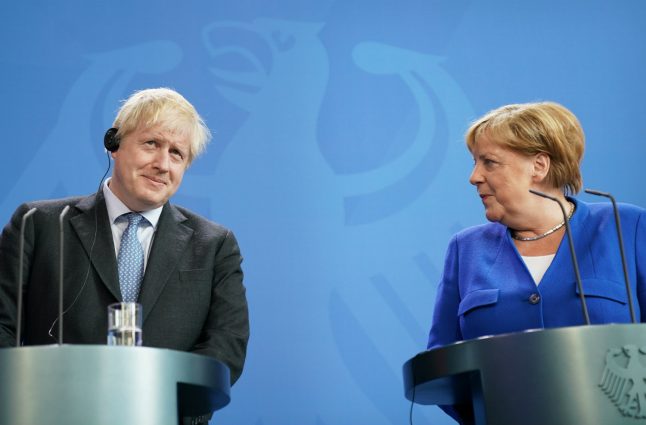UK Prime Minister Boris Johnson was accused of playing a “stupid blame game” on Tuesday after Downing street sources appeared to blame German chancellor Angela Merkel for pushing the Brexit talks between Brussels and London to the brink of collapse.
After a phone call between Johnson and Merkel an anonymous Downing Street source briefed broadcast journalists in the UK, saying Merkel “made clear a deal is overwhelmingly unlikely and she thinks the EU has a veto on us leaving the customs union”.
“Merkel said that if Germany wanted to leave the EU they could do it no problem but the UK cannot leave without leaving Northern Ireland behind in a customs union and in full alignment for ever,” said the source.
“She said Ireland is the government’s special problem and Ireland must at least have a veto on NI leaving. Merkel said the PM should tell Northern Ireland it must stay in full alignment for ever but that even this would not eliminate customs issues,” the source said according to the Guardian newspaper.
“It was a very useful clarifying moment in all sorts of ways. If this represents a new established position then it means a deal is essentially impossible not just now but ever. It also made clear that they are willing to torpedo the Good Friday agreement.”
According to the BBC, the prime minister's office believes talks are now “close to breaking down”.
In Berlin, a spokesman for the German government confirmed the two leaders had spoken but said he would not comment on the content of the call.
But EU leaders and politicians in the UK slammed the briefing by a Downing Street source.
Donald Tusk, the European council president, tweeted directly at Johnson: “What’s at stake is not winning some stupid blame game. At stake is the future of Europe and the UK as well as the security and interests of our people. You don’t want a deal, you don’t want an extension, you don’t want to revoke, quo vadis? [Where are you going?]”
And Scotland's first minister Nicola Sturgeon said: “The UK government’s attempt to shift the blame for the Brexit fiasco to anyone but themselves – today it’s Merkel – is pathetically transparent.”
The latest developments came after leaks from the European Commission showed major concerns from the EU about the UK's Brexit plan.
Johnson unveiled his new plan last week aimed at keeping Britain's border with EU member Ireland free-flowing after Brexit – a crucial issue in the divorce talks between Brussels and London.
It envisages keeping Northern Ireland aligned with the EU's single market regulations, but part of a UK-wide customs territory.
But this would mean customs checks on the Irish border, something the EU has long opposed.
READ ALSO: Merkel stresses EU unity as Britain sends new Brexit plan
The Downing Street source reportedly said that Tuesday's call was a “very useful clarifying moment in all sorts of ways”, with the result that “a deal is essentially impossible not just now but ever”.
Open evenings for Brits in Germany
It comes as uncertainty over Brexit and its implications continues for British nationals living in Germany.
A series of open evenings organized by the British Embassy and German authorities are being held throughout the country for Brits to ask questions about Brexit and how to prepare.
There are events in Frankfurt on October 10th, Hamburg on October 15th and Munich on October 24th.
Information evenings have already been held in Berlin and Düsseldorf.
The meetings are free and open to all interested UK nationals although registration is necessary.



 Please whitelist us to continue reading.
Please whitelist us to continue reading.
Member comments